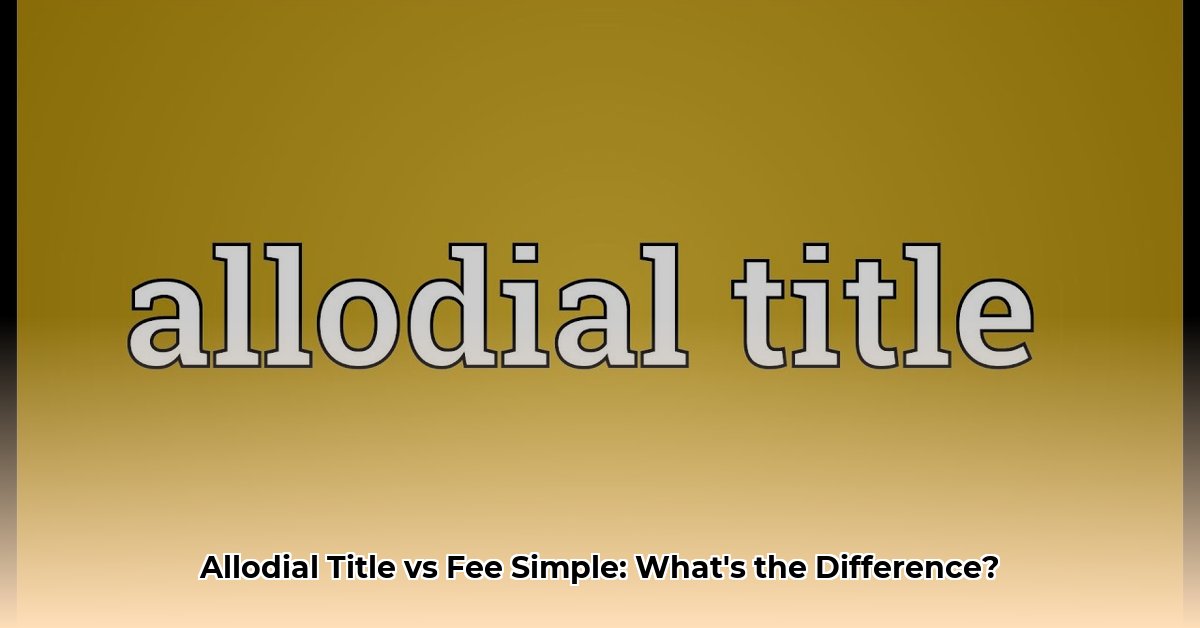Demystifying Allodial Title
Allodial title. It’s the stuff of property dreams – owning land completely free and clear, with no government oversight or pesky property taxes. But how much of this is reality, and how much is myth? This article delves into the intricacies of allodial title, exploring its historical roots, legal definitions, and modern relevance. We’ll compare it to the more common fee simple ownership, examine its potential advantages and disadvantages, and guide you through the steps to research land titles.
A Historical Perspective
Allodial title harkens back to a time before feudalism, a system where land ownership was a privilege granted by a higher authority, typically a king or lord. Allodial title stood apart, representing absolute ownership free from feudal obligations. This historical context adds to its mystique, but what does it mean in today’s world?
Defining Allodial Title: Separating Fact from Fiction
Allodial title embodies complete ownership of land, free from any superior landlord—even the government. This means no property taxes, no zoning restrictions, and immunity to eminent domain. Sounds idyllic, right? However, in practice, pure allodial title is exceedingly rare. While some jurisdictions recognize forms of ownership resembling allodial title, governments nearly always retain inherent powers like taxation and the possibility of eminent domain for legitimate public use.
Allodial vs. Fee Simple: A Critical Comparison
Most property owners hold land under fee simple title. This grants extensive rights to use and enjoy the property, but it’s not absolute. The government retains ultimate ownership, imposing regulations and levying taxes. Here’s a comparison:
| Feature | Allodial Title | Fee Simple Title |
|---|---|---|
| Superior Owner | None (in theory) | Government retains ultimate ownership |
| Property Taxes | None (in theory) | Required |
| Eminent Domain | Immune (in theory) | Subject to, with just compensation |
| Government Control | None (in theory) | Subject to regulations (zoning, etc.) |
| Prevalence | Extremely rare | Very common |
Where Might Allodial Title Exist? A Global Search
Pinpointing locations with true allodial title is a challenging endeavor. While often debated, some areas with unique legal histories may offer something close:
- Isle of Man: This self-governing British Crown dependency retains elements of its Nordic legal heritage, resulting in a form of ownership—allod—that grants landowners substantial autonomy.
- Orkney and Shetland Islands (Scotland): The historical influence of Norse law has led to “udal tenure,” a system with similarities to allodial title.
- Barony of Bachuil (Scotland): This area holds a unique historical status that predates Scotland’s feudal system, with the Baron reportedly holding land allodially.
It’s crucial to emphasize that even in these locations, the government likely maintains certain powers. Claims of allodial title elsewhere often lack strong evidence and require rigorous investigation.
Researching Land Titles: A Practical Guide
Investigating land ownership requires diligent research:
- Jurisdictional Inquiry: Start by researching the specific region’s land ownership laws. Contact local land registries or government offices for information.
- Title Search: Conduct a thorough title search, either independently or with a title company, to uncover the property’s ownership history.
- Legal Counsel: Consult with a real estate attorney specializing in land titles. They can provide expert insights into the area’s specific legal framework.
Weighing the Pros and Cons
While the ideal of allodial title is alluring, the practical benefits are often debated:
Potential Advantages:
- Theoretical Freedom from Taxation and Government Control: This represents the core allure, but its realization is highly improbable in practice.
- Symbolic Importance: For some, absolute ownership holds significant philosophical value, representing independence and self-reliance.
Likely Disadvantages:
- Extreme Rarity and Difficulty of Acquisition: Establishing and defending allodial title is complex, expensive, and often unsuccessful.
- Ongoing Legal and Regulatory Realities: Even with allodial title (or a close approximation), governments likely retain inherent powers, particularly regarding public safety and welfare.
The Future of Allodial Title
Allodial title, while largely a historical concept, continues to fuel discussions about property rights and individual liberty. Could technological advancements like blockchain reshape land ownership in the future, perhaps leading to new forms of decentralized property management? The conversation remains open, and further research may reveal intriguing possibilities.
Disclaimer
This information is for educational purposes only and is not legal advice. Consult with a qualified legal professional for guidance on any property ownership matters.
- Cooking Kits Make Mastering New Recipes Fun for Everyone - February 4, 2026
- Leak-Proof Glass Food Containers with Locking Lids Keep Food Fresh - February 3, 2026
- Glass Storage Containers With Glass Lids That Lock for Freshness - February 2, 2026










